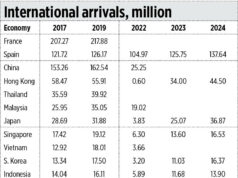In most democratic societies, midterm elections are seen not only as a referendum on the performance of a sitting government/political party. It may also determine to what extent can the current administration move forward unencumbered with its agenda — or whether it will need to begin building bipartisan confidence in order to govern with its symbolic authority intact.
Bipartisanship, sadly, has never been a strong suit of the administration of Rodrigo Duterte. (Or at least, it is clearly confident in its presumed mandate to not even bother with it.) To be sure, commentators and partisans of the administration might point to the passage of legislation by non-administration solons as proof of bipartisanship. However, we could also equally make the case that such happened in spite of, and not because of, the administration’s agenda.
Furthermore, its consistent hounding of opposition voices plus its persistent disregard of the rule of law and international standards of human rights do not inspire confidence. These hurt its pretensions to legitimate democratic governance — despite persistent spinning by Malacañang’s communication offices. Coverage of commentary by other political analysts in the Philippines already suggest that the laggardness/backsliding of many of our political institutions are already hurting the chances of the Philippines in pursuing genuine development — despite confident economic figures and projections.
The 2019 midterm elections should be framed not only as the Duterte administration’s affirmation of its mandate to its (presumed) 16.6 million voters last 2016. It should already have been utilized as a rallying cry for opposition forces (most of whom claim to genuinely respect democratic institutions) to appeal to the other, projected 47 million potential voters (out of the close to 63 million registered voters announced by the Commission on Elections).
Unfortunately, it seems the rhetoric of the senatorial campaign (at least looking at the administration-backed Hugpong ng Pagbabago and the opposition Otso Diretso slate) is still centered on personalistic “credentials-shaming” discourse. At face value, this is not entirely without basis. After all, the job of national-level legislation does require a willingness to engage in midnight-oil study, deskwork and field consultation. However, to presume that educational and professional attainment is the appropriate and sole basis for electing lawmakers would be to ignore (if not violate) the entire democratic spirit of the 1987 Constitution.
Our senators are not only supposed to be “the best and brightest” by academic and professional reckoning. They are supposed to be the ones with proven reputation and public standing to be working on behalf of the national good — not merely “national patrons” expected to bring home any bacon to their provincial hometowns or allied areas. Looking at the names on the Hugpong slate and the ones endorsed by President Duterte, we are regaled by names of those with multiple allegations and proven instances of corruption and plunder. Criticisms of the cheap gimmicks of the slate (as well as the persistent evasion of Imee Marcos regarding her degrees) are at least understandable.
But the way partisans of Otso Diretso (not necessarily the candidates themselves) have tried to sell themselves have not properly capitalized on the regime slate’s weaknesses. So far, they have simply been going about brandishing the CVs of their bets, without a united, clear platform of legislation and governance.
They are yet to demonstrate that they intend to be a solid bloc that can fiscalize against the overreaching actions of the administration. There is still no clear indication (save the individual promises of the candidates themselves) that they intend to push for sector-relevant legislation — and that they will mobilize together inside the Senate to do such. Furthermore, the campaigners of the team seem to have forgotten that much of the misgivings and resentments of the Filipino public against the Aquino administration’s governance pitfalls will continue to hound them, whether they want to or not.
If any, the discourse of those seeking to support the opposition slate — motivated as they are by certain “moralistic”/“patronizing” rhetoric, might hurt them even more. Works published by the Ateneo de Manila University (such as Frederic Schaffer’s The Hidden Costs of Clean Election Reform and Wataru Kusaka’s Moral Politics in the Philippines) demonstrate how campaigning that “shames” the voting public is more often than not going to further alienate them from the advocacy/issue/personality being campaigned for.
How, then, should our candidates approach our kababayans? If experience and recorded research is any indication, the demands of the Filipino public vis-à-vis their prospective leaders and lawmakers don’t change. To quote the Institute of Philippine Culture (IPC)’s 2004 study “The Vote of the Poor,” “they value educational qualifications, but they were also suspicious about those with superior education. They said experience and good intentions more than compensate for a lack of college education.” At the same time, our countrymen might still be beholden to “idealistic notions of leadership, valuing qualities such as piety, helpfulness, sincerity, and responsibility.”
Is it a matter, therefore, of merely “choosing the ‘right’ candidate,” whatever our personal biases of “being right” means? This should not be the case. Legislative representation requires choosing the candidates that represent our issues best, which is almost always different from the kind of “righteousness” candidates market themselves to us.
In my personal experience (both as a scholar and as a participant in advocacy groups), the last thing any campaign wants would be for its good intentions to be questioned, especially if it overlooked some key considerations and frustrations of its target audience. One can only wish that those who entered the Senate race — more so those claiming to restore some semblance of democratic value to our government institutions — have not, once again, ignored the fears that brought us here in the first place (or worse, fomented them in the first place).
Hansley A. Juliano serves as Lecturer to the Department of Political Science, School of Social Sciences, Ateneo de Manila University. He is also engaged in research and advocacy for various sectoral issues (such as labor rights and agrarian reform).



